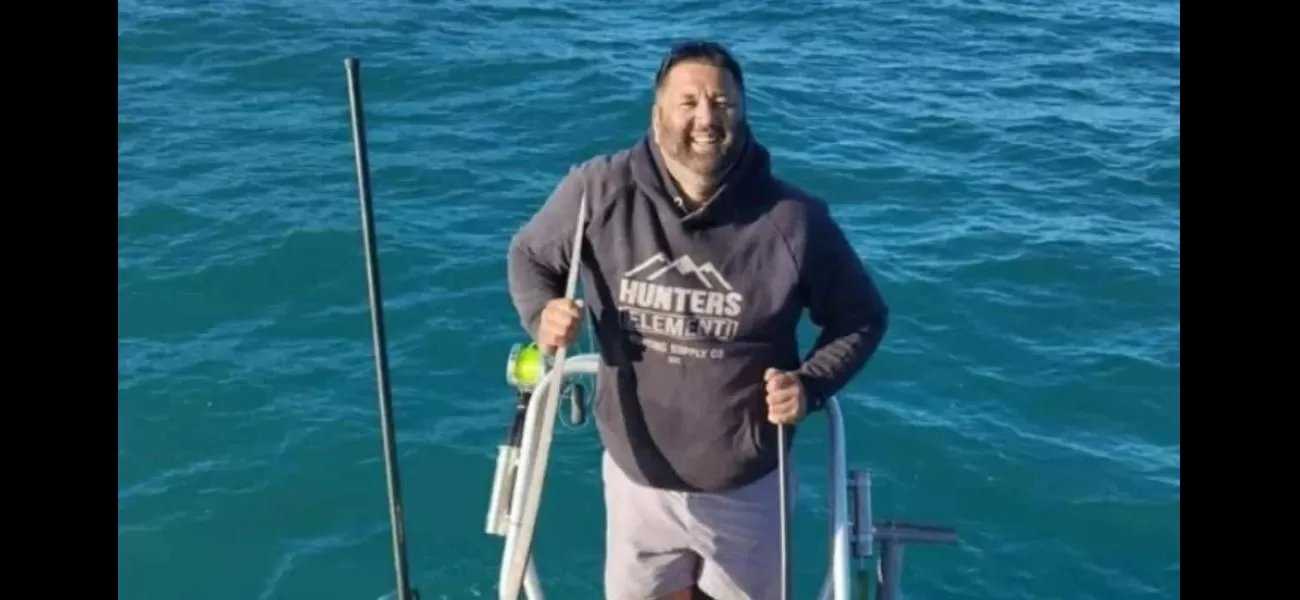Bluefin fishing is dangerous yet profitable.
Many people travel to New Zealand's North Island to catch the sought-after southern bluefin tuna, but it can be a perilous endeavor. Three lives were lost last week.
June 30th 2024.

The waters off the eastern seaboard of New Zealand's North Island are a popular destination for fishermen hunting for the prized southern bluefin tuna. However, last week, tragedy struck when three experienced fishermen lost their lives during their hunt. Despite the dangerous conditions that have led to close calls for many fishermen in the past, they continue to return to this notorious stretch of water.
The area has a reputation for treacherous waters, and many big game fishermen have stories of their own close calls to share. Waihau Bay, a picturesque headland, draws people from all over New Zealand during the winter months to try their hand at catching the prized bluefin tuna. However, just a week ago, three fishermen did not return from their trip.
Elwood Higgins, Taina Sinoti, and Damien MacPherson were all passionate and experienced fishermen who set out with two other boats in perfect weather conditions. However, things quickly changed as the wind and swell increased, causing two of the boats to turn back at 11am. Despite attempts to reach them via radio, there was no response from Higgins, Sinoti, and MacPherson. Tragically, their bodies were found two days later on the shore of Māhia.
As the tight-knit fishing community mourned the loss of their fellow fishermen, it was revealed that just two weeks prior, the New Zealand Sport Fishing Council had released a podcast series discussing the risks of bluefin fishing in the area. Now, the council's communications and operations manager, Mike Plant, hopes that this series will serve as a reminder to all fishermen to stay safe while out on the water.
According to Plant, the main challenge of this stretch of water is the convergence of strong swells, which can quickly lead to waves as high as 2 meters. These conditions can change rapidly, making it a difficult and dangerous area for fishing. Plant explains that every boat has a close call story, and it's important for fishermen to be aware of the risks that come with hunting for bluefin tuna.
Despite these risks, fishermen continue to return year after year, drawn by the rich history of the area. In the past, the fishing grounds were overfished by Japanese longliners, resulting in a significant decline in the bluefin tuna population. However, after sustainable management efforts and regulations to keep the Japanese ships further offshore, the tuna population has made a remarkable comeback. This has led to a "goldrush" for recreational fishermen, who are now able to catch the prized fish close to shore. The bluefin tuna caught in this area can weigh anywhere from 30 to 150 kilograms, making it a valuable source of kai (food) for families and their communities. Plus, the taste of the fish is said to be the best in the world.
One of the fishermen who can attest to this is Toby Barkla, skipper at Cascade Charters in Whakatane. He describes the bluefin as both delicious to eat and an exciting game fish to fight. The fish can be found swimming at depths of about 1000 meters, which means that fishermen must venture out to exposed areas, such as Cape Runaway, in search of them. While this does come with its risks, Barkla believes it's just part of fishing and emphasizes the importance of being prepared and equipped with proper safety gear.
Unfortunately, not all fishermen take these precautions. Some have been known to take unnecessary risks, such as launching their boats at night in unfamiliar waters. However, the bluefin fishery has also brought about positive changes, such as creating a year-round game fishing industry and providing a sustainable source of kai for local fishermen. This has been a significant success story for New Zealand, as just a few decades ago, the bluefin tuna population was in danger of extinction.
The recent tragedy has left the fishing community devastated, and many are now reflecting on how this could have been prevented. Both Barkla and Plant stress the importance of having proper safety equipment and being aware of the dangers of the area. As a committee member of the Whakatane Sport Fishing Club, Barkla has organized a tuna fishing competition to raise funds for the families of the three fishermen and to promote safety among competitors. The club has already raised a considerable amount of money, and they hope to continue to spread awareness about the risks of fishing for bluefin tuna.
The deaths of Elwood Higgins, Taina Sinoti, and Damien MacPherson have left a profound impact on the fishing community. It serves as a reminder that even experienced fishermen can fall victim to the unpredictable and dangerous conditions of the waters off New Zealand's eastern seaboard. As Barkla puts it, "It could happen to any one of us." It is now up to the fishing community to come together and learn from this tragedy to ensure the safety of all those who venture out to hunt for the prized southern bluefin tuna.
The area has a reputation for treacherous waters, and many big game fishermen have stories of their own close calls to share. Waihau Bay, a picturesque headland, draws people from all over New Zealand during the winter months to try their hand at catching the prized bluefin tuna. However, just a week ago, three fishermen did not return from their trip.
Elwood Higgins, Taina Sinoti, and Damien MacPherson were all passionate and experienced fishermen who set out with two other boats in perfect weather conditions. However, things quickly changed as the wind and swell increased, causing two of the boats to turn back at 11am. Despite attempts to reach them via radio, there was no response from Higgins, Sinoti, and MacPherson. Tragically, their bodies were found two days later on the shore of Māhia.
As the tight-knit fishing community mourned the loss of their fellow fishermen, it was revealed that just two weeks prior, the New Zealand Sport Fishing Council had released a podcast series discussing the risks of bluefin fishing in the area. Now, the council's communications and operations manager, Mike Plant, hopes that this series will serve as a reminder to all fishermen to stay safe while out on the water.
According to Plant, the main challenge of this stretch of water is the convergence of strong swells, which can quickly lead to waves as high as 2 meters. These conditions can change rapidly, making it a difficult and dangerous area for fishing. Plant explains that every boat has a close call story, and it's important for fishermen to be aware of the risks that come with hunting for bluefin tuna.
Despite these risks, fishermen continue to return year after year, drawn by the rich history of the area. In the past, the fishing grounds were overfished by Japanese longliners, resulting in a significant decline in the bluefin tuna population. However, after sustainable management efforts and regulations to keep the Japanese ships further offshore, the tuna population has made a remarkable comeback. This has led to a "goldrush" for recreational fishermen, who are now able to catch the prized fish close to shore. The bluefin tuna caught in this area can weigh anywhere from 30 to 150 kilograms, making it a valuable source of kai (food) for families and their communities. Plus, the taste of the fish is said to be the best in the world.
One of the fishermen who can attest to this is Toby Barkla, skipper at Cascade Charters in Whakatane. He describes the bluefin as both delicious to eat and an exciting game fish to fight. The fish can be found swimming at depths of about 1000 meters, which means that fishermen must venture out to exposed areas, such as Cape Runaway, in search of them. While this does come with its risks, Barkla believes it's just part of fishing and emphasizes the importance of being prepared and equipped with proper safety gear.
Unfortunately, not all fishermen take these precautions. Some have been known to take unnecessary risks, such as launching their boats at night in unfamiliar waters. However, the bluefin fishery has also brought about positive changes, such as creating a year-round game fishing industry and providing a sustainable source of kai for local fishermen. This has been a significant success story for New Zealand, as just a few decades ago, the bluefin tuna population was in danger of extinction.
The recent tragedy has left the fishing community devastated, and many are now reflecting on how this could have been prevented. Both Barkla and Plant stress the importance of having proper safety equipment and being aware of the dangers of the area. As a committee member of the Whakatane Sport Fishing Club, Barkla has organized a tuna fishing competition to raise funds for the families of the three fishermen and to promote safety among competitors. The club has already raised a considerable amount of money, and they hope to continue to spread awareness about the risks of fishing for bluefin tuna.
The deaths of Elwood Higgins, Taina Sinoti, and Damien MacPherson have left a profound impact on the fishing community. It serves as a reminder that even experienced fishermen can fall victim to the unpredictable and dangerous conditions of the waters off New Zealand's eastern seaboard. As Barkla puts it, "It could happen to any one of us." It is now up to the fishing community to come together and learn from this tragedy to ensure the safety of all those who venture out to hunt for the prized southern bluefin tuna.
[This article has been trending online recently and has been generated with AI. Your feed is customized.]
[Generative AI is experimental.]
0
0
Submit Comment





